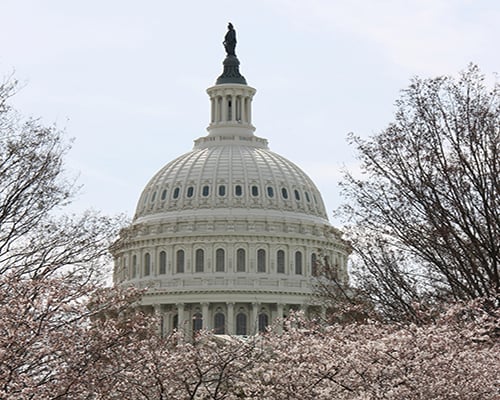Public Policy and Government Affairs
Biweekly Washington, D.C., Update for the Week Ending April 17, 2020
Written by: Hanh Le

Both chambers of Congress have adjourned for legislative business until May 4. Over the past weeks, legislators have discussed providing further funding for the Coronavirus Aid, Relief, and Economic Security Act (CARES) and introducing additional coronavirus relief legislation.
Upcoming Space Foundation Events:
April 29, 2 p.m. ET “Ready to Fight: How the Space Industry Is Leading the Charge to Combat COVID-19” Webinar
- The event is hosted by the Space Foundation and the CompTIA Space Enterprise Council.
- Hear from Viasat, Planet, and Microsoft representatives on how their companies use technologies such as satellite communications, imagery, logistics, and data analytics to help combat the COVID-19 pandemic and support affected communities.
- Register for the event here.
Oct. 31 – Nov. 2, 36th Space Symposium, Colorado Springs, CO
- This year’s Space Symposium has been rescheduled for Sat., Oct. 31, through Mon.,
Nov. 2, 2020. - Given the date and timing changes for this year’s Symposium program, attendees will
find a new agenda posted online.
Space Policy Updates:
- The NASA Independent Review Panel released a report on the Center for the Advancement of Science in Space’s (CASIS) operations and management of the ISS National Lab. (NASA,
April 6) - Reps. Eddie Bernice Johnson (D-TX) and Kendra Horn (D-OK) released statements on the Independent Review of the ISS National Lab Management. (House Science Committee, April 9)
- Senators Tammy Duckworth (D-IL) and Brian Schatz (D-HI) asked the General Accounting Office (GAO) to examine the FCC’s long-standing decision to exempt satellite systems from environmental reviews. (SpaceNews, April 10).
- The Space Acquisition Council plans to meet and discuss measures to assist the aerospace industry. (SpaceNews, April 11)
- The National Reconnaissance Office (NRO) is shifting its strategy with the decision to award multiple commercial imagery contracts in Q4 2020. (Breaking Defense, April 13)
- The Air Force awarded a contract for space startups to study and analyze information about activities in cislunar space near the moon. (SpaceNews, April 14)
- U.S. Space Command said Russia’s anti-satellite missile test is proof that Russia’s space weapons threaten American satellites. (SpaceNews, April 15)
- The Space Enterprise Consortium asked members to evaluate the impact of the COVID-19 pandemic on small businesses. (Space News, April 15)
- The FCC’s decision to approve Ligado Network’s 5G spectrum application has drawn negative comments from industry officials (Space News, April 16), as well as from legislators such as Rep. Mac Thornbery (R-TX), and Sens. Jim Inhofe (R-OK) and Jack Reed (D-RI). However, Sen. Mark Warner (D-VA) urged the FCC to follow Chairman Ajit Pai’s lead to approve Ligado Network’s application.
Space Industry Updates:
- Production on the Russian Soyuz-2 rocket has been suspended due to coronavirus safety concerns. (SpaceNews, April 10)
- VOX Space will launch 44 technology demonstration satellites for the U.S. Space Force. The first launch is slated for October 2021. (C4ISRNET, April 13)
- The UK Space Agency and the European Space Agency announced a £2.6 million fund to develop space-enabled technology, and support use of drone technology to deliver test kits and Personal Protective Equipment (PPE) in response to the pandemic. (European Space Agency, April 14)
- The Mars 2020 rover mission is still on track to launch between July 17 and August 5. (Space News, April 15)
Additional Space Foundation Resources:
- The Space Report Quarter 1 – 2020 provides significant insights on workforce development, spacecraft activities, statistics, and analyses covering satellites for communication, Earth observation, and navigation.
- The latest Space4U Podcast episode features Dr. Ulyana Horodyskyj, a glaciologist, geologist, and founder of Science in the Wild. In the podcast, she discusses the meaning of “citizen science,” and shares her experiences as commander of a deep space mission simulation as part of NASA’s Human Exploration Research Analog (HERA XII) project.
- Online learning, lesson plans, and video lessons for students grades K–12 are available at the Discovery Center website.
Reading:
The Gazette (Colorado Springs) column | This awful challenge is our Apollo 13 moment by Tom Zelibor, Space Foundation CEO
- The space community often responds quickly to solve new challenges. Those who adapt and overcome can provide powerful leadership in these unprecedented situations.
- The article shares insights on the benefits of innovation, and why listening to unlikely sources for solutions can provide critical tools to access in times like these.
- The article also discusses lessons learned from the Apollo 13 mission and how they can be applied to the ongoing COVID-19 pandemic.
Space Trivia:
On April 17, 1998, NASA launched the Space Shuttle Columbia (STS-90), with the mission of performing experiments to study the effects of microgravity on the nervous system (Neurolab).
